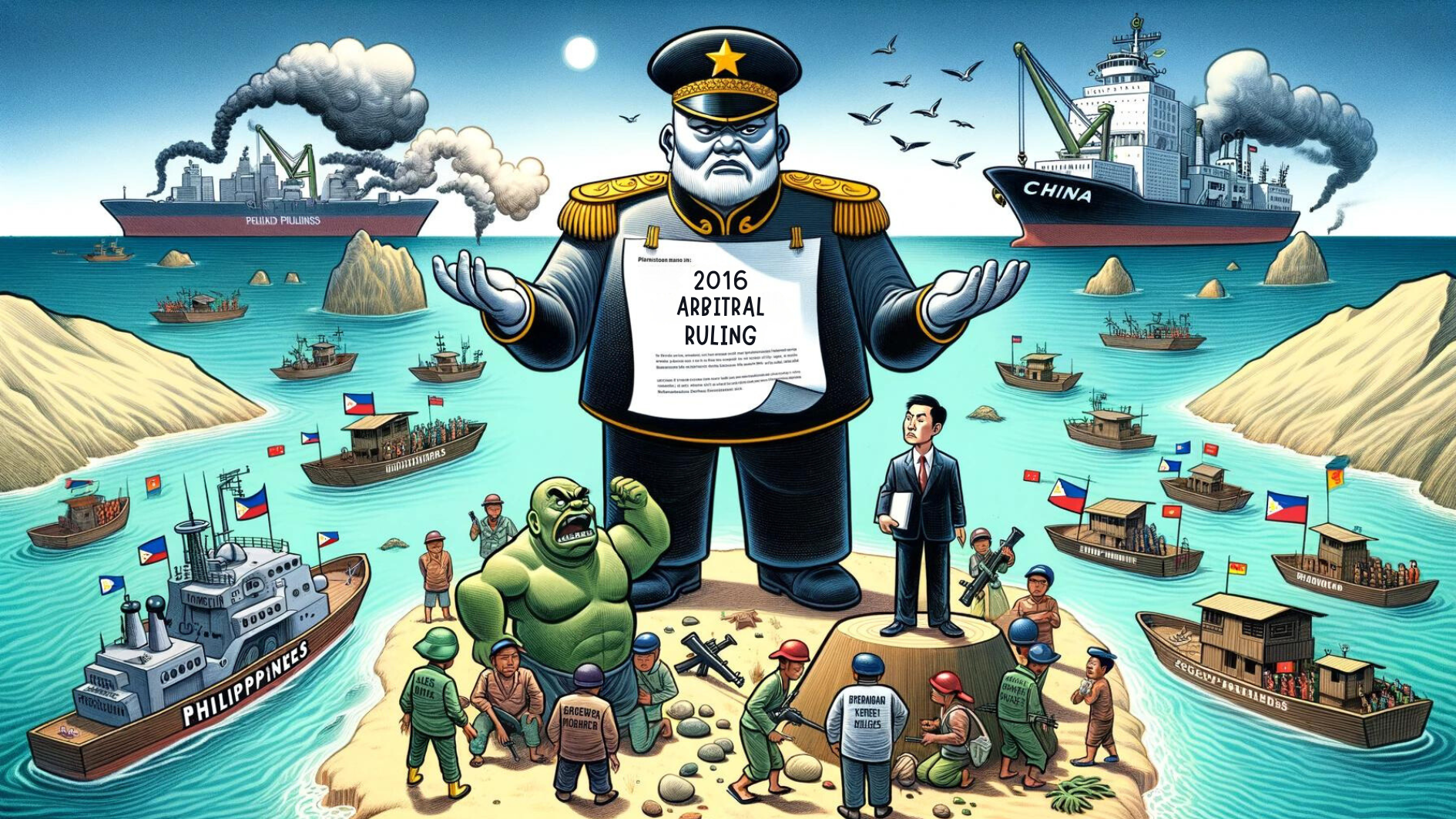Tensions between the Philippines and China arising from a territorial dispute over the Spratly Islands in the West Philippine Sea (WPS) have shown no signs of easing up. China has refused to recognize the July 12, 2016 ruling of the Permanent Arbitral Tribunal in favor of the Philippines’ rights to its Exclusive Economic Zone (EEZ) in the WPS. Beijing has always maintained “indisputable sovereignty” over most of the South China Sea based on the baseless nine- and now ten-dash line claim.
Beijing’s repudiation of the decision – and, in effect, of the United Nations Convention on the Law of the Sea as part of a rules-based international order – supported in no small measure by former President Rodrigo Duterte’s unwillingness to assert the Philippines’ entitlements in the WPS as prescribed by the ruling, defined the direction of the policy currents on the disputed waters during his watch.
The impact of Duterte’s submissive stance with regard to the WPS and turning a blind eye to hostile Chinese actions there would extend beyond his term. Since last year, in fact, China has increased its aggressive posture in the contested archipelago, particularly in the vicinity of Ayungin Shoal, which the Tribunal recognized as within the Philippines’ EEZ, attacking Philippine vessels on routine resupply missions with water cannons and harassing Filipino fishermen.
The Philippines first took possession of Ayungin Shoal, called Second Thomas Shoal by the US Board of Geographic Names, in 1999, during the Estrada administration, by grounding the BRP Sierra Madre, a Philippine Navy transport ship being maintained by a contingent of marines.
China also lambasted the holding of joint military exercises between the Philippines and the United States as an act of provocation.
Narratives have been spread online questioning and/or criticizing the Marcos administration’s policy with regard to the WPS issue, in particular the revitalization of security ties with the US, a reversal of its predecessor’s pivot to China.

Done by Chinese state media as well as groups and individuals in the Philippines that either have pro-China sentiments or are apprehensive about the implications of such a policy, the spread of these narratives has apparently reached the level of influence operations. The propagators warned of a possible economic backlash and even a full-blown war with China should the United States further increase its military presence in the region.
For its part, the US cited freedom of navigation and overflight as the linchpin of security in the Pacific, thus the need to maintain respect for international law. US actions though are apparently meant to protect its geopolitical interests especially with the emergence of China as a rising world power and the ever present threat of a Chinese invasion of Taiwan, an American ally.
For virtually the entire 20th century, the US maintained a strong military presence in the Asia-Pacific region by maintaining bases and troops in the Philippines until 1991, when the Philippine Senate voted to not renew the 1947 Military Bases Agreement. But in 1998, the US and the Philippines under President Joseph Estrada inked the Visiting Forces Agreement, allowing the former colonizer to again establish its military presence in the islands through joint exercises called Balikatan. The latest Balikatan was held from April 22 until May 8 this year in sites that included Palawan, the island closest to the Spratlys.
In February 2023, the Marcos administration revived the Enhanced Defense Cooperation Agreement signed with the US in 2014 during the time of the late President Benigno S. Aquino III. But the pact was not fully implemented at that time due to legal and political challenges, and was almost shelved during the Duterte era. EDCA’s revival boosted US military presence in the archipelago through joint maritime patrols, use of five Philippine military facilities, and prepositioning of military hardware at them.
Moves by both China and the US to strengthen their presence in the South China Sea, and corresponding policy responses by the previous and current Philippine administrations, have become the point of contention of an ongoing cyber battle between groups and individuals with either pro-China or pro-US agenda. Since the Philippines apparently has the moral ascendancy given its legal victory before the Permanent Arbitral Tribunal, China has relied on information warfare, in addition to confrontational moves in the WPS.
‘Don’t overly celebrate’
The Arbitral ruling favoring the Philippines’ claims to entitlements in the WPS was handed down on July 12, 2016, on the second week of Duterte as president. Then Foreign Affairs Secretary Perfecto Yasay Jr. (now deceased) appeared lukewarm to the decision, if not apprehensive about its repercussions [on Philippines-China relations]. Far from issuing a celebratory statement, he said: “Our experts are studying the Award with the care and thoroughness that this significant arbitral outcome deserves. In the meantime, we call on those concerned to exercise restraint and sobriety.”
Yasay’s statement was consistent with his pronouncement during the first Cabinet meeting of the Duterte administration on June 30, 2016, that he was “adverse to the idea” of heeding the wish by some foreign governments for Manila to issue a stronger statement in case of a favorable ruling by the tribunal, echoing Duterte’s remarks on the need for the government to further study the ruling’s repercussions.
Yasay also broached the idea of arrangements in the WPS such as joint exploration and utilization of resources with China and other claimant countries.
Reacting to Yasay’s “anemic statement” after the Arbitral Tribunal ruling, political analyst Dindo Manhit said, “The government’s statement yesterday did not feel like it was a victory. I felt bad as a Filipino. We should claim this as a legal victory.”
Delfin Lorenzana, Duterte’s Defense secretary, explained Yasay’s “somber” appearance when he read his statement on the ruling. Lorenzana said that before the ruling was announced all Cabinet members were ordered by Duterte to not “overly celebrate.”
War bogy, other excuses
Yasay, in a separate statement issued on the occasion of Duterte’s first state visit to China in October 2016, said “pursuing a hard line in pushing our EEZ claims” would exacerbate tensions and heighten the risk of war or the use of force. Duterte himself would frequently raise the specter of a possible armed confrontation in response to calls for stronger measures to assert the Arbitral Tribunal’s ruling.
In his “Gikan sa Masa, Para sa Masa” program on the Apollo Quiboloy-owned SMNI TV station on Nov. 6, 2023, Duterte, commenting on the “verbal sparring” between Philippine Coast Guard spokesperson Commodore Jay Tarriela and retired Chinese senior air force colonel Zhou Bo, senior fellow of the Center for International Security and Strategy, Tsinghua University, China in a conference on the South China Sea on Oct. 26 in Vietnam, said:
“…It’s a question of territory. It’s all water, but still territory. According to them, I said it’s just water. Correct. It’s because underneath the water are resources. But actually what I’m saying is why would we fight to the death over that water.
“In short, we can only talk. We cannot go beyond words, period. If we go to arms, we’d be nothing. We can only use words. I’m not trying to justify or defend China. As a matter of fact, at least, I don’t like what they do, they drive away small fishermen there. In God’s grace, they’re not doing it now, to the credit of China.”
Duterte went on to say, “Total, ilan lang naman makuha na isda rin diyan ng mga fisherman natin (Anyway, only a few fish can be caught there by our fishermen),” downplaying the importance of the WPS to the country’s fisheries sector.
But the Philippine Space Agency, citing a 2020 study titled “The fisheries of the South China Sea: Major trends since 1950” by D. Pauly and C. Liang, said the WPS hosts a diverse marine ecosystem that comprises around 30 percent of the coral reef in the country with its Kalayaan Group of Islands, and contributes to around 27 percent of the country’s commercial fisheries production, “which serves as a crucial source to support the country’s economy and food security.”
Reckless statement
On one occasion, Duterte, consistent with his lack of will to assert the Philippines’ rights in the WPS, uttered what turned out to be a careless remark about the Tribunal decision that vindicated the country’s claims. On Dec. 17, 2016, upon returning from state visits to Cambodia and Singapore, he declared, “In the play of politics now, I will set aside the arbitral ruling.”
In a forum held almost two years later, then Acting Chief Justice Antonio Carpio said he was alarmed because such a declaration could have rendered the Arbitral ruling meaningless. He explained that in international law there’s a doctrine that declarations publicly made by the head of state or government or by the foreign minister and manifesting the will to be bound may have the effect of creating legal obligations.
After he made calls to his friends at the Department of Foreign Affairs asking them to clarify, Carpio said, Yasay issued a statement that Duterte was not deviating from the decision and that the Philippine government “reaffirms its respect for and firm adherence to this milestone ruling and will be guided by its parameters when tackling the issue of maritime claims in the South China Sea.”
Carpio said China’s statement welcoming Duterte’s remark came “too late” or four hours after the DFA issued the clarification.
“So we have to be very careful that we don’t waive the award because of careless talk,” he said in the same forum.
‘Gentleman’s Agreement’

In March this year, lawyer Harry Roque told the media that Duterte had made a “gentleman’s agreement” with China with regard to the territorial dispute in the WPS.
Roque, who served as Duterte’s presidential spokesperson, said Duterte agreed to observe the status quo in the disputed waters, that is, his government would not send construction materials to the stranded BRP Sierra Madre, only basic supplies to Philippine troops stationed there.
In 2023, President Ferdinand Marcos Jr. denied the existence of such an agreement and said that if there was one, he was rescinding it.
The National Security Council likewise dismissed claims about such an agreement. Responding to an article by Manila Times columnist Rigoberto Tiglao that the commitment to remove the BRP Sierra Madre was done in 1999, the same year it was grounded there by the Estrada administration, NSC spokesperson Jonathan Malaya said what Tiglao published was a memo from former Secretary Albert del Rosario stating that China said there is such a commitment by the Philippine government, but there was no indication in the document that there is indeed a commitment, only a claim by China that there is such a commitment.
Malaya added that China’s insistence on the supposed commitment is part of its psychological warfare against the Philippines.
Other Philippine officials have also aired strong sentiments regarding the previous administration’s virtual submission to Chinese schemes in the WPS in general and to the “gentleman’s agreement” in particular, something that was conspicuously absent during Duterte’s watch.
“Let us not fall into the trap set by Chinese propaganda of refocusing the debate on a so-called promise, while deflecting attention away from China’s government, thereby freeing and allowing them to continue with their illegal activities,” Defense Secretary Gilbert Teodoro said in a statement.
NSC Secretary Eduardo Año said the supposed agreement during the previous administration is among the “twisted and baseless narratives” that Filipinos must be aware of, adding, “These are clearly black propaganda used to create distractions, divisions, and conflict among our people.”
For his part, Carpio called the agreement lopsided and gave China “veto power over our exclusive right to erect structures on Ayungin Shoal.”
Interestingly, lawyer Salvador Panelo, also a former spokesperson for Duterte, claimed that the former President did not make such an agreement with China. The contradictory statement from Panelo forced Roque to issue a clarification that the agreement for a status quo covered the entire WPS, not just Ayungin Shoal and the fate of BRP Sierra Madre.
Reacting to the contradictory statements of Roque and Panelo, former Senator Leila de Lima said on X (Twitter) last April 2, “Two years after they left office, the Duterte Cabinet continues its tradition of disorganization, incompetence and confusion.”
Duterte himself echoed Panelo’s claim that he did not enter into any agreement concerning the WPS, but added that he did agree to keep the status quo in the disputed waters to avoid war.
China, however, refuted Duterte. On April 18, the spokesperson of the Chinese Embassy in Manila said that the “gentleman’s agreement” reached during the previous administration was “no secret” and was aimed at “managing the situation on the ground, maintaining peace and preventing conflicts,” at the shoal.
The Chinese Embassy statement added that the agreement had guided both parties from June 2022, the start of the Marcos administration, through early February 2023, “effectively maintaining peace and stability” at Ren’ai Jiao (the Chinese name for the shoal).
The statement further claimed that both sides agreed early this year on a “new model” for the management of Ayungin Shoal “after rounds of serious communications with the Philippine military” but that the Philippine side abandoned the arrangements “for no good reason,” a claim that Manila also denied.
“Now, this ‘new model’ announced by the Chinese Embassy is nothing more than a new invention. As the President has clearly stated, there is no agreement whatsoever about Ayungin Shoal and that we shall continue to do all activities within the bounds of international law and we shall brook no interference in our lawful actions,” a PNA article quoted Año as telling journalists who attended a seminar conducted by the National Task Force on the West Philippine Sea.
After insisting on the “gentleman’s agreement” and the “new model,” China dropped yet another bombshell. According to a news report on 4 May 2024, the Chinese Embassy in Manila publicized what it claims to be an unwritten 2016 “temporary special arrangement” on Panatag (Scarborough) Shoal. The agreement, reached during Duterte’s visit to Beijing, allowed small-scale fishing around the islands but restricted access by military, coast guard, and other official planes and ships to the 12 nautical mile (22 kilometer) limit of territorial waters.
Commodore Jay Tarriela denied the existence of any such agreement in which Duterte effectively waived the Philippines’ sovereign rights in the sandbank, which is inside the country’s EEZ, albeit temporarily, in the words of Carpio.
If Duterte indeed agreed to this “temporary special arrangement,” it’s as if he had ceded Panatag to China.
What the future holds
Protecting the country’s entitlements and sovereign rights in the WPS and ensuring that the benefits of the rich marine resources there are enjoyed by the Filipinos requires the Philippines to reinforce its legal victory at the Arbitral Tribunal with a strong maritime presence in the contested waters to contain, if not roll back, Chinese expansionism. The goal is not to start a shooting war but to send Beijing the message that it needs to abide by international law and respect the South China Sea as a free maritime domain.
Economically handicapped, however, to match China’s military capability, the Marcos administration has been left with no option but to revitalize security arrangements with the US and open new ones with neighboring Japan and Australia.
On the legislative front, Congress would do the country a favor by allocating more budget to the Philippine Navy than to the Philippine Army, now that internal security threats have greatly diminished and external defense has become a more paramount concern.
It would not be difficult for the current administration to rally people’s support for the WPS issue. A June 2022 survey by Pulse Asia commissioned by Stratbase-ADR Institute showed that 89 percent of Filipinos want Marcos to assert the country’s rights in the WPS based on the 2016 Arbitral Tribunal ruling.

The survey also found that 90 percent of Filipinos from all socioeconomic classes across all regions want the new administration to improve its maritime defense capability and form alliances with other countries to defend the Philippine territorial rights in the WPS.
On top of that, civil consciousness about the need to defend the WPS has found concrete expression in the formation of the Atin Ito Coalition, which embarked last month on a “peace and solidarity regatta” to Panatag Shoal, breaching a Chinese naval blockade, to distribute 1,000 liters of fuel and 200 food packs to Filipino fishermen in the area.
Atin Ito Coalition describes itself as “a gathering of social movements, NGOs, fisherfolk organizations, concerned artists and citizens, Church leaders and entrepreneurs that are embarking on a visionary initiative to unify the different sectors and segments of Philippine society around the cause and situation of our WPS fisherfolk and frontliners.”
“We believe that by supporting our WPS fisherfolk and frontliners, we demonstrate that we care about the well-being of all Filipinos, regardless of their circumstances and geographical locations. Aiding our WPS fisherfolk and frontliners shows the underlying qualities of empathy and compassion that define us as Filipinos and as a nation, and guarantees that future generations will have access to the same maritime resources that have nourished our country for millennia. This duty alludes to our obligation as Filipino citizens to leave a legacy of abundance, ensuring that our national heritage is preserved for future Filipinos.”
On the part of the government, the National Task Force on the West Philippine Sea said it will employ a more aggressive communications strategy to combat fake news and misinformation being peddled by China. This development shows that Philippine officials have now realized the need to engage China head-on in the arena of information warfare.
There are apprehensions though that all these may be negated if a pro-China candidate wins the 2028 presidential election. All eyes are on Vice President Sara Duterte, the former President’s daughter, a leading contender for President who has not issued a categorical statement on where she stands on the WPS issue. It’s premature to conclude on the Vice President’s foreign policy outlook, but her indecisiveness may give a hint.
For now, the future of the WPS is not etched on stone but on the shifting tides of its troubled waters. (H. Marcos C. Mordeno/MindaNews)
(This analysis was produced with support from an Internews initiative aiming to build the capacity of news organizations to understand and monitor disinformation and influence operations in the Philippines.)



